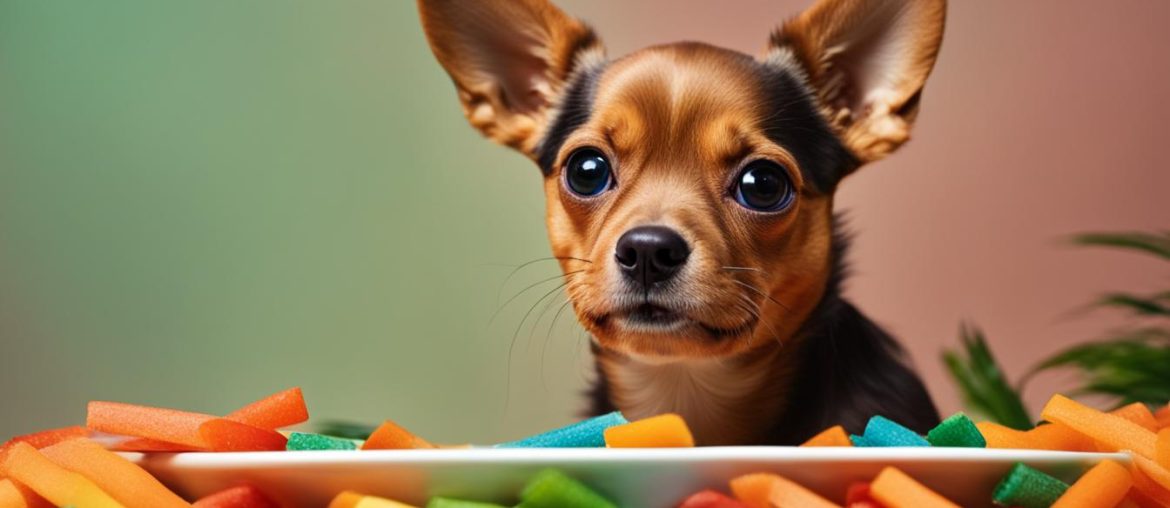Welcome to my expert analysis on the topic of whether dogs can safely consume veggie straws. As a professional in the field of canine nutrition, I understand the importance of providing dogs with a balanced and healthy diet. In this article, we will explore the potential risks associated with feeding veggie straws to dogs and gain valuable insight into creating a canine diet that promotes optimal health and well-being.
Key Takeaways:
- While veggie straws may be a popular snack among humans, they are not suitable for dogs due to their limited nutritional value.
- Opt for dog-friendly snacks that are specifically designed to meet their dietary needs and provide essential nutrients.
- When it comes to the canine diet, it is important to prioritize a balance of proteins, carbohydrates, healthy fats, and vitamins.
- Offering fruits, vegetables, and lean meats as treats can be a healthier alternative for dogs.
- Consult with a veterinarian to ensure that you are providing your beloved pet with a diet that supports their overall health and longevity.
What Are Veggie Straws Made From?
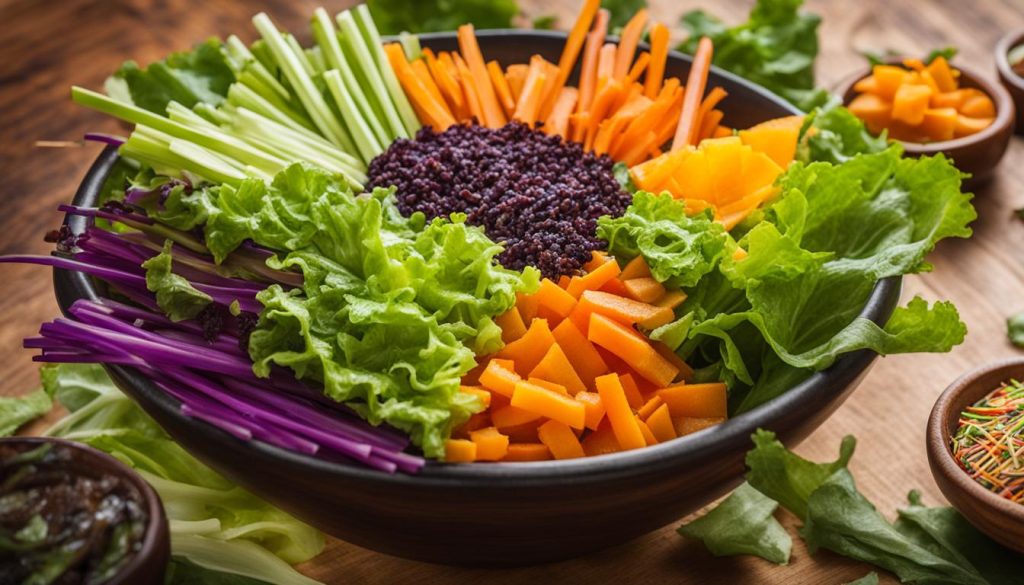
Veggie straws, a popular snack among humans, are primarily made from potato flour, potato starch, and corn starch. However, it is important to note that the potato component undergoes a process known as pulverization, where it loses most of its nutritional value. This means that while veggie straws may have a vegetable-based name, they offer little to no nutritional benefits.
Aside from the main ingredients, different types of veggie straws may also contain additional components such as tomato paste, spinach powder, turmeric, and beetroot powder. These ingredients are used to enhance the flavor and color of the snacks, but they do not significantly contribute to their nutritional value.
Overall, the primary ingredients in veggie straws are potato-based, but the processing methods and additional additives limit their overall nutritional content.
Comparative Analysis of Veggie Straws Ingredients:
| Veggie Straws Type | Primary Ingredients | Additives |
|---|---|---|
| Veggie Straw A | Potato flour, potato starch, corn starch | Tomato paste, spinach powder |
| Veggie Straw B | Potato flour, potato starch, corn starch | Turmeric, beetroot powder |
| Veggie Straw C | Potato flour, potato starch, corn starch | Tomato paste, turmeric, beetroot powder |
Table: Comparative analysis of the primary ingredients and additives in different types of veggie straws.
The Effects of Potatoes in Veggie Straws on Dogs

When considering the impact of potatoes in veggie straws on dog health, it’s important to understand that dogs are primarily carnivorous animals. While potatoes themselves are not harmful to dogs, the pulverized potatoes used in veggie straws offer little to no nutritional value. These pulverized potatoes are primarily composed of fats, sodium, additives, and artificial flavors, which can contribute to weight gain and potential health issues in dogs.
Dogs require a balanced and species-appropriate diet to thrive, and the nutritional value of the food they consume plays a crucial role in their overall well-being. Unfortunately, veggie straws, with their low nutritional content and high levels of processed ingredients, do not meet these requirements. Feeding dogs veggie straws as a regular part of their diet can be detrimental to their health and may lead to deficiencies in essential nutrients.
As responsible pet owners, it’s essential to prioritize the health and well-being of our dogs by providing them with proper nutrition. Instead of offering veggie straws, opt for dog-friendly snacks that are specifically designed to meet their dietary needs. This can include fruits and vegetables such as carrots, cucumbers, and apples, which offer natural vitamins and minerals. Additionally, lean cuts of cooked meat without seasoning can provide a nutritious and safe alternative to veggie straws.
Remember, maintaining a balanced and nutritious diet is vital for the overall health and longevity of our beloved pets. Always consult with a veterinarian for guidance on providing the optimal nutrition for your dog.
| Nutrient | Content in Pulverized Potatoes |
|---|---|
| Protein | Negligible |
| Fat | High |
| Sodium | High |
| Additives and Artificial Flavors | Present |
The Impact of Corn in Veggie Straws on Canine Health
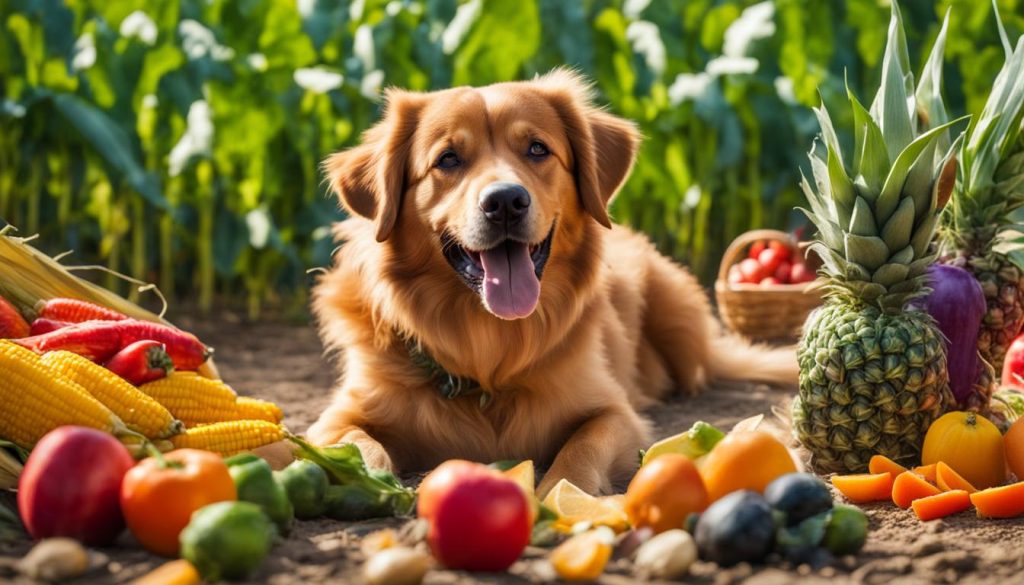
When it comes to the health of our furry companions, it’s important to consider the impact of different ingredients in their snacks. Corn, a common component of veggie straws, has both nutritional benefits and potential drawbacks for dogs.
Whole corn is a healthy food for dogs, providing essential nutrients such as carbohydrates, vitamins, protein, potassium, linoleic acids, and fiber. However, it’s worth noting that the corn used in veggie straws is often processed and may contain added salt, fats, and high levels of sodium. These additives can diminish the nutritional value of corn and make it less beneficial for dogs.
Furthermore, some dogs may have allergies or sensitivities to corn or corn-based products. If your furry friend has shown any adverse reactions to corn in the past, it’s best to avoid offering them veggie straws or any other snacks containing corn.
The Nutritional Benefits of Whole Corn for Dogs:
| Nutrient | Amount per 100g of Whole Corn |
|---|---|
| Carbohydrates | 74g |
| Protein | 9.4g |
| Fiber | 7.3g |
| Potassium | 287mg |
| Vitamin C | 6.8mg |
| Vitamin B6 | 0.4mg |
“Whole corn is a nutritious food for dogs, providing valuable carbohydrates, protein, fiber, and essential vitamins and minerals.”
When choosing snacks for your four-legged friend, it’s important to prioritize their health and well-being. Instead of relying on veggie straws, consider offering alternative dog-friendly snacks that provide nutritional value without potential drawbacks. Carrots, cucumbers, apples, and watermelon can all make excellent, healthy treats for dogs. Additionally, lean cuts of cooked meat, free from seasonings, can be a tasty and nutritious option.
The Nutritional Value of Veggie Straws as Dog Treats
When it comes to choosing dog treats, it’s important to consider the nutritional value and the preferences of our furry friends. While veggie straws may seem like a healthy option due to their vegetable-based composition, they may not provide the necessary nutrition that dogs need in their diet. Let’s explore the nutritional value of veggie straws as dog treats and why it may be best to choose alternative options.
Why are veggie straws not ideal for dogs?
Veggie straws lack essential nutrients that dogs require for optimal health. These snacks are often low in protein, an essential component for muscle development and overall growth in dogs. Additionally, veggie straws may contain additives and artificial flavors that can be detrimental to a dog’s well-being. While they may be a tasty option for humans, dogs have different nutritional needs that are better met through specially formulated treats.
Choosing healthier alternatives
Fortunately, there are numerous dog-friendly snacks available that provide both nutrition and flavor. Fruits such as apples and watermelon can be a refreshing and nutritious option for dogs, as they contain vitamins and natural sugars that are beneficial to their health. Vegetables like carrots and cucumbers are also great choices, offering essential vitamins and minerals while satisfying a dog’s need to chew. Additionally, lean meats such as chicken or turkey, cooked without seasoning, can be a protein-rich treat for dogs.
The importance of consulting a veterinarian
While it’s important to consider the nutritional value and preferences of our dogs when selecting treats, it’s always a good idea to consult with a veterinarian. They can provide personalized recommendations based on your dog’s breed, age, and specific dietary needs. A veterinarian can also guide you in choosing the most appropriate treats that offer the right balance of nutrition and enjoyment for your beloved pet.
What to Do If Your Dog Eats Veggie Straws
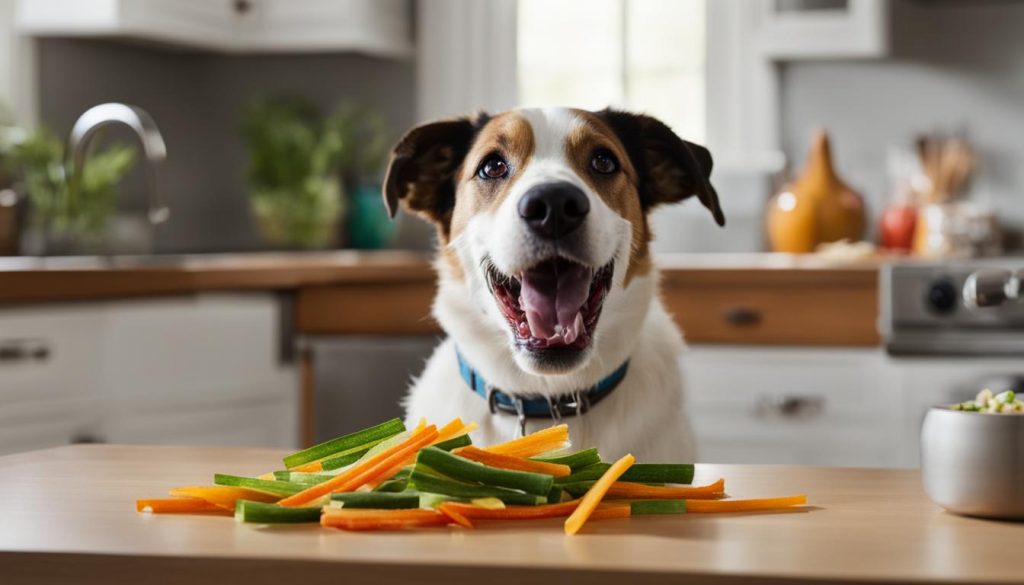
If your dog accidentally ingests a small amount of veggie straws, there is generally no immediate cause for concern. However, it is important to take certain steps to ensure your dog’s health and well-being.
First, clean up any remaining pieces of veggie straws and prevent your dog from accessing any more. This will help minimize the risk of further ingestion and potential health issues.
Next, closely monitor your dog’s behavior and health in the hours following the ingestion. Keep an eye out for any signs of unusual behavior, gastrointestinal distress, or other symptoms that may indicate a problem. If you notice any concerning signs, it is recommended to consult with a veterinarian for guidance.
Table: Signs to Monitor after Dog Ingests Veggie Straws
| Signs to Monitor | Action |
|---|---|
| Lethargy or weakness | Take note and observe for any changes. |
| Vomiting or diarrhea | Monitor frequency and consistency. Contact a veterinarian if it persists or worsens. |
| Loss of appetite | Observe eating habits and contact a veterinarian if it continues for an extended period. |
| Excessive thirst | Ensure fresh water is available. Contact a veterinarian if excessive thirst persists. |
| Abdominal discomfort or bloating | Take note of any signs of discomfort and consult a veterinarian if it persists. |
It is always better to be cautious when it comes to your dog’s health. If you have any doubts or concerns about your dog’s ingestion of veggie straws, seeking professional advice from a veterinarian is the best course of action.
The Dangers of Xylitol in Veggie Straws
While veggie straws do not typically contain xylitol, it is important to be cautious of other products that might contain this sweetener. Xylitol is a natural sugar substitute that can be highly toxic to dogs, leading to serious health complications, including liver failure. Even small amounts of xylitol can be dangerous, so it is crucial to avoid giving your dog any food items or treats that contain this ingredient.
Xylitol is commonly found in sugar-free gums, candies, baked goods, and some peanut butters. It is important to thoroughly read labels and check for the presence of xylitol before offering any food to your dog. If you suspect that your dog has ingested a product containing xylitol, it is essential to seek immediate veterinary care. Prompt treatment can greatly increase the chances of a positive outcome.
To protect your dog’s health and well-being, keep all foods containing xylitol securely out of their reach. This includes being mindful of items that may be within their reach, such as purses, backpacks, and kitchen countertops. Additionally, it is important to educate yourself and others in your household about the dangers of xylitol to ensure the safety of your furry friend.
Remember, prevention is key when it comes to xylitol poisoning in dogs. By being vigilant and avoiding foods and products that contain this sweetener, you can help keep your dog safe and healthy.
Table: Common Foods Containing Xylitol
| Product | Potential Xylitol Content |
|---|---|
| Sugar-Free Gum | Varies by brand, typically 1-2 grams per piece |
| Sugar-Free Candy | Varies by brand, typically 0.5-1 gram per piece |
| Sugar-Free Baked Goods | Varies by recipe and brand |
| Sugar-Free Peanut Butter | Varies by brand, can range from trace amounts to high concentrations |
Dangerous Foods for Dogs: What You Need to Avoid
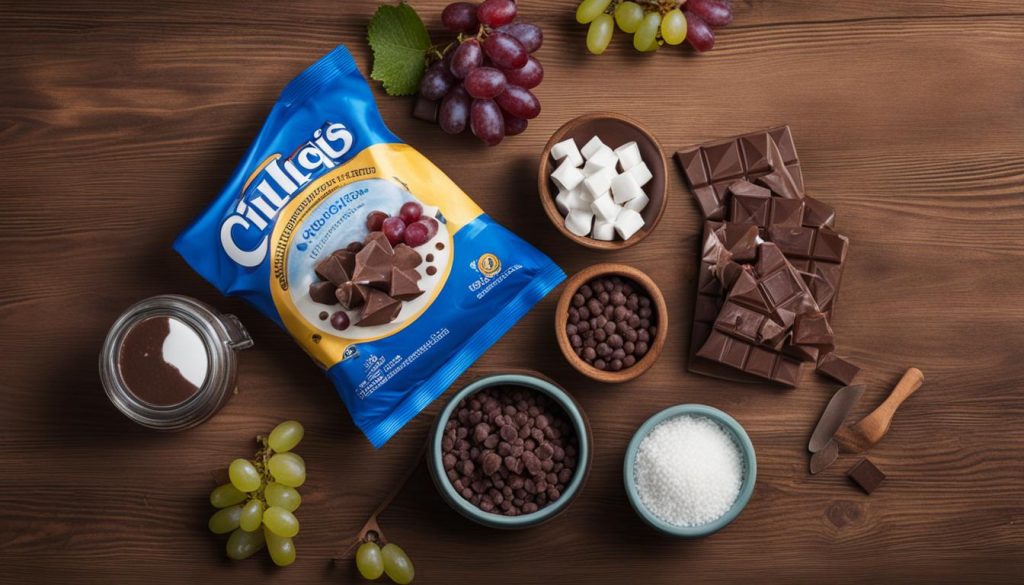
When it comes to feeding our furry friends, it’s important to be aware of the foods that can be harmful or even toxic to dogs. As responsible pet owners, we must take precautions to keep these dangerous foods out of their reach. Here are some common human foods that you should avoid feeding to your dogs:
“Candies, gums, onions, garlic, alcohol, grapes, raisins, chocolate, fatty meats, and bread dough.”
These foods can pose serious health risks to dogs, potentially causing symptoms ranging from gastrointestinal upset to organ failure. Let’s take a closer look at why these foods are dangerous for our furry companions.
Dangerous Foods for Dogs: The Risks and Symptoms
1. Chocolate: Chocolate contains theobromine, a substance that dogs cannot metabolize effectively. Ingesting chocolate can lead to symptoms such as vomiting, diarrhea, increased heart rate, tremors, and seizures.
2. Grapes and Raisins: These seemingly harmless fruits can cause kidney failure in dogs. Even small amounts can be toxic, leading to symptoms like loss of appetite, vomiting, diarrhea, and increased thirst.
3. Onions and Garlic: Onions and garlic, whether raw, cooked, or in powdered form, contain compounds that can damage a dog’s red blood cells, leading to anemia. Symptoms may include weakness, pale gums, lethargy, and an elevated heart rate.
Remember, this is not an exhaustive list of dangerous foods for dogs, so it’s always best to consult with your veterinarian if you’re unsure about a particular food item. By avoiding these harmful foods, we can help keep our four-legged friends healthy and safe.
| Foods to Avoid | Health Risks | Symptoms |
|---|---|---|
| Chocolate | Theobromine toxicity | Vomiting, diarrhea, increased heart rate, tremors, seizures |
| Grapes and Raisins | Kidney failure | Loss of appetite, vomiting, diarrhea, increased thirst |
| Onions and Garlic | Anemia | Weakness, pale gums, lethargy, elevated heart rate |
Healthy Alternatives for Dogs
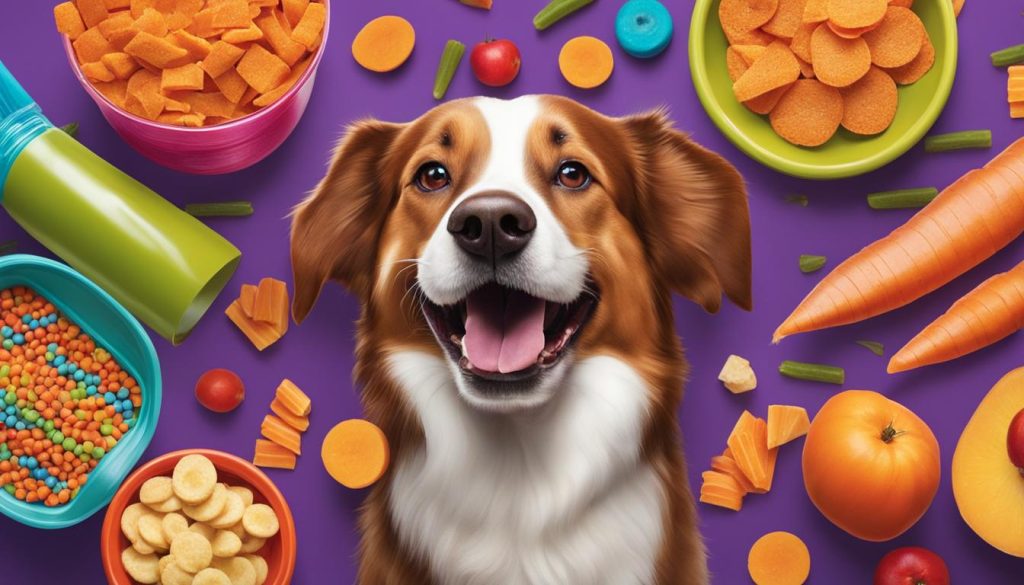
When it comes to choosing snacks and treats for your furry friend, it’s important to opt for healthy options that provide nutritional benefits. Here are some dog-friendly alternatives to veggie straws that you can incorporate into your canine’s diet:
Fruits and Vegetables
Fruits and vegetables can be excellent choices for dogs as they offer a variety of vitamins, minerals, and fiber. Carrots make a crunchy and low-calorie snack that promotes dental health. Cucumbers are refreshing and hydrating, while apples provide a natural source of antioxidants.
Please be aware that not all fruits and vegetables are safe for dogs. Avoid feeding them grapes, raisins, onions, and garlic, as these can be toxic. Always consult with your veterinarian to ensure you’re selecting the right fruits and vegetables for your dog’s specific dietary needs.
Lean Meat
Lean cuts of cooked meat, such as chicken or turkey without any seasoning, can be a protein-rich and delicious treat for dogs. Make sure to remove any bones, skin, and excess fat before offering it to your furry companion. This can also be an excellent way to incorporate variety into your dog’s diet.
Remember, moderation is key when it comes to treats. It’s essential to consider your dog’s overall calorie intake and ensure that treats are given in proportion to their daily meals. As with any changes in diet, it’s always best to consult with a veterinarian to determine the most suitable options for your dog’s individual needs and health conditions.
| Treat | Description |
|---|---|
| Carrots | Crunchy, low-calorie snack that promotes dental health. |
| Cucumbers | Refreshing and hydrating. |
| Apples | Natural source of antioxidants. |
| Lean cuts of cooked meat | Protein-rich treat with no seasoning. |
Wrapping Up
To summarize, it is not recommended to feed veggie straws to dogs. These snacks lack the necessary nutritional balance that dogs require in their diet. While veggie straws may be a popular choice for humans, they do not offer the same benefits for canine health.
When it comes to a dog’s diet, it is crucial to prioritize their nutritional needs and choose dog treats that are specifically formulated to meet those requirements. Feeding dogs a well-balanced and species-appropriate diet is essential for their overall well-being.
If you’re looking for suitable dog treats, consider options that are designed with dogs in mind. There are plenty of healthy alternatives available, such as treats made from fruits, vegetables, or lean meats. These options can provide dogs with the necessary nutrients while also satisfying their taste preferences.
Ultimately, as pet owners, it is our responsibility to ensure that our beloved dogs receive a balanced diet and appropriate treats. Consult with a veterinarian to create a dietary plan that aligns with your dog’s specific needs and to receive personalized guidance on maintaining optimal nutrition for your furry friend.
FAQ
Can dogs eat veggie straws?
Veggie straws are not recommended for dogs due to their limited nutritional value and potential health risks.
What are veggie straws made from?
Veggie straws are primarily made from potato flour, potato starch, and corn starch. They may also contain additional ingredients such as tomato paste, spinach powder, turmeric, and beetroot powder.
What are the effects of potatoes in veggie straws on dogs?
The pulverized potatoes used in veggie straws offer little to no nutritional value for dogs. They are primarily composed of fats, sodium, additives, and artificial flavors.
What is the impact of corn in veggie straws on canine health?
While whole corn can be a healthy food for dogs, the processed corn used in veggie straws often contains added salt, fats, and high levels of sodium. Dogs may also be allergic to corn or corn-based products.
Are veggie straws good for dogs?
Veggie straws are not recommended as dog treats due to their lack of nutritional value and potential harmful effects. Dogs are unlikely to enjoy eating them as much as humans do, and it is best to choose treats specifically designed for dogs.
What should I do if my dog eats veggie straws?
If your dog accidentally eats a small amount of veggie straws, there is no immediate cause for concern. Clean up any remaining pieces and monitor your dog closely for any signs of unusual behavior or illness. Consult a veterinarian if symptoms arise.
Are there dangers of xylitol in veggie straws?
Veggie straws do not typically contain xylitol. However, it is important to be cautious of other products that might contain this sweetener, as xylitol can cause a dangerous drop in blood sugar levels and potentially lead to liver failure in dogs.
What are common foods that are harmful to dogs?
Several common human foods can be harmful or toxic to dogs, including candies, gums, onions, garlic, alcohol, grapes, raisins, chocolate, fatty meats, and bread dough. It is important to keep these foods out of reach of dogs to prevent potential health issues.
What are healthy alternatives for dogs?
Instead of offering veggie straws or other potentially harmful foods, opt for healthy alternatives for your dog. Dogs can enjoy fruits and vegetables such as carrots, cucumbers, apples, and watermelon. Lean cuts of cooked meat without seasoning can also be a nutritious and safe treat for dogs.
Can dogs have a balanced diet without veggie straws?
Yes, dogs can have a balanced diet without veggie straws. It is essential to prioritize a balanced and species-appropriate diet for dogs, including specific treats designed for their dietary needs. Consult with a veterinarian for guidance on providing optimal nutrition for your beloved pet.


